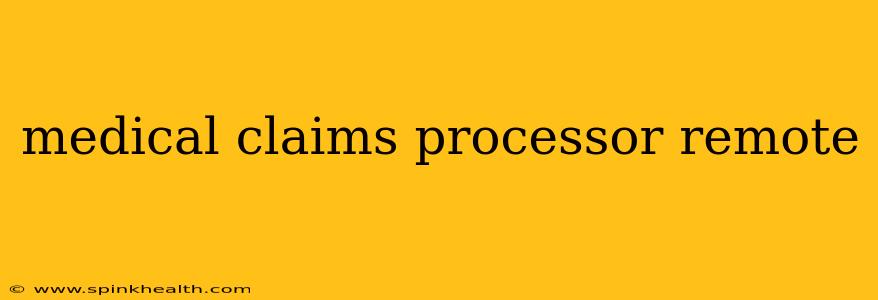The Remote Revolution: A Medical Claims Processor's Tale
The hum of the office, the clatter of keyboards, the constant ringing of phones – these are sounds many associate with the life of a medical claims processor. But the world of work is changing, and for medical claims processors, the remote revolution is in full swing. This isn't just about working from home; it's about a new landscape of opportunity, flexibility, and challenges. This is the story of how remote work is reshaping this vital role in healthcare.
My journey began in a bustling office, surrounded by colleagues. The work was demanding: meticulous attention to detail, a deep understanding of medical terminology, and the ability to navigate complex insurance regulations. Every claim was a puzzle, requiring careful examination to ensure accurate billing and timely reimbursements. The pressure was real, but there was a sense of camaraderie, a team spirit that fueled us through long days.
Then came the shift. The pandemic forced many companies to embrace remote work, and the medical claims processing industry was no exception. Initially, there was apprehension – would the transition be smooth? Could we maintain the same level of productivity and accuracy working remotely? The answer, surprisingly, was a resounding yes.
What are the typical responsibilities of a remote medical claims processor?
This wasn't simply a matter of taking our existing roles and moving them online. Remote work demanded adaptability. We had to master new technologies, improve our communication skills, and learn to manage our time effectively without the structure of a traditional office environment. The core responsibilities, however, remained the same:
- Reviewing medical records: Ensuring the accuracy and completeness of medical documentation supporting the claim.
- Coding and billing: Assigning appropriate ICD and CPT codes, and submitting claims to insurance providers.
- Following up on claims: Contacting insurance companies to resolve denials and appeals.
- Maintaining accurate records: Keeping meticulous records of claims and patient information.
- Adhering to HIPAA regulations: Protecting the privacy and security of patient health information.
What skills are essential for a remote medical claims processor?
The transition to remote work highlighted the importance of certain skills:
- Technical proficiency: A strong understanding of medical billing software and electronic health records (EHR) systems is crucial.
- Strong communication skills: Effective written and verbal communication is vital for collaboration with colleagues and insurance providers.
- Problem-solving skills: The ability to quickly identify and resolve issues with claims is essential.
- Time management skills: Working remotely requires self-discipline and the ability to manage time effectively.
- Adaptability: The ability to adapt to new technologies and processes is important in a rapidly changing industry.
What are the advantages and disadvantages of being a remote medical claims processor?
The advantages are undeniable:
- Flexibility: The ability to work from anywhere with an internet connection.
- Improved work-life balance: More time for family and personal pursuits.
- Reduced commute time: More time and less stress.
However, there are also challenges:
- Isolation: The lack of face-to-face interaction can lead to feelings of isolation.
- Distractions: Working from home can present distractions that can affect productivity.
- Technology issues: Reliance on technology can lead to interruptions if internet or software malfunctions occur.
What qualifications are needed to become a remote medical claims processor?
Becoming a remote medical claims processor typically requires:
- A high school diploma or equivalent.
- Medical billing and coding certification (e.g., CPC, CCS, CCA).
- Experience in medical billing and coding (though entry-level remote positions exist).
- Proficiency in medical terminology and insurance procedures.
The transition to remote work hasn’t been without its hurdles, but it has undeniably opened up new possibilities for medical claims processors. It’s a testament to the adaptability of professionals in this field and a sign of the evolving landscape of healthcare. As the industry continues to embrace technology and remote work practices, the future for remote medical claims processors appears bright, promising a blend of professional fulfillment and the flexibility of a modern workstyle.

